Autobiography of the Founder of God’s Goods
Who’s your Prophet?
Who am I to found a religion catering to atheists, ecologists, libertines, humanists and believers? Read on.
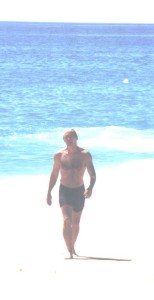
I want to rescue Eden and Humanity from the neglect and foolishness many religions have imposed. Too much, our air, soil, rivers, oceans, and life-systems, and our human prerogatives, abilities and responsibilities, have been allowed to deteriorate under the beliefs many religions promote. They ignore life, or waste it at whim, while urging gullible but sincere believers to devote their lives to elaborate illusions. They may mean well, but the goodness of their intent is mired in old, dysfunctional scriptures, practices, presumptuous authority, and preposterous preachings.
I’m not one to feign piety or push fantastic beliefs. Those who do – annoy me. I’m largely humanistic (humans are free, fallible, and able), naturalistic (nature is dear; it is our origin and home), and deistic (the divine is found more through nature than scripture).
For me, God is not what many theistic religions believe in and brandish. Rather, God is the answer to what Is that we know must be, yet is beyond us. We don’t create the universe, except as we attempt to perceive, label and use it. Rather, it creates us, allowing our speculation, investigation, and potential mastery. How it does and why ─ I call “God.” That some revere this, or detest it, or serve it, or forget it – doesn’t primarily concern me.
The point of God’s Goods isn’t God; it is God’s goods. As explained in other entries on this web site, God’s goods are listed in Genesis One on page one of the Bible. Though I don’t think we have to believe in God or the Bible, I take the lesson of its opening as suitable to rescuing the meaning, and the life, it represents. That mythic foundational story (underlying the scriptures of all three theistic religions) clearly states that God generates our actual cosmos and all life in an evolutionary process. From light to land to life to us, we are created and deemed “good” by God. We live in, and are of, the goodness of natural existence. We should live up to ourselves in it. What is good? The cosmos is, and in and of the cosmos, Earth, and on and of the Earth, all Life, and evolved of that Life, us humans, males and females. Natural existence is godly and good.
Studying the reality of nature itself and consciousness itself unveils whatever God may be inherent in it or of at origin. Scriptures and religious authorities might lead us to God, or they might lead us to silly exaggerations and destructive delusions. Science, humanism and mysticism can make more religious sense to me because they take our actual world seriously and responsibly. These make for practical connection.
We love whatever Creator there is by serving Creation. Or we love and serve Creation itself, in and of itself. Either way, we live up to ourselves in our part of Creation. Relating well to our precious reality, physical and spiritual, is the prophecy I promote. I think of religion as “relating well with reality.”
The reality I wish us to relate well with is at least this obvious, given, unavoidable, physical, living, conscious realm made up of the energy of atoms and reaching out to the far galaxies. But micro and macro further reaches don’t interest me as much as the local ecological, social, psychological and spiritual context in which we live our lives. There may be other dimensions and after-lives; I don’t care. Until we take care of our home base – planet earth, our societies, our bodies ─ we’ve no business pining for more than this grand gift we are given. Living well on Earth is my religion.
We could live a long time on planet Earth. It spins reliably and we’ve recently come to understand much of how it works. We know enough to know we could turn our earthly Eden into a poisoned, exhausted wasteland ─ or into a fully flourishing, reliably abundant wonderland. Both hell and heaven are feasible outcomes just doing what we know works, either way.
What steers our direction, veers the vast momentum of social and technological habits, is in part our mythic foundation, religious sensibilities, intelligent thoughts, and internal urges and decisions. If we value our earth and our bodies, we can rescue and revive them to flourish as never before. We live up to the goods we are made of and meant to actualize. This is not lonely. It is with each other, all life, and whatever divine reality is inherent.
Don’t believe; behave. Don’t cower; create. Don’t deny; celebrate.
But prophecy doesn’t profit the prophet. People don’t like hearing sensible “if-then” relationships, so they try to ridicule and ignore the prophet, ignore the miracles that make and sustain us while praying for fantasy miracles to rescue them from our personal and collective plights. Yet, in the larger economy and ecology of human involvement, prophecy is needed. My approach, grateful for the larger cosmos that generates life and allows us to evolve, is critical of most religions, appreciative of some, and seeks better relationships among humans, with life, reality, and “God.”
Though prophesy usually doesn’t pay, I choose to devote my life to it, trusting a decent living in return. This is my “real work.”
For me, this calling to prophesy came, not a single blinding flash, but an accumulation of realizations and inclinations gathered over a lifetime. Age 70 now, it is time to deliver these over in service of God’s goods. Here’s what led to my founding my religion, God’s Goods and its web site, earthlyreligion.org
My Story
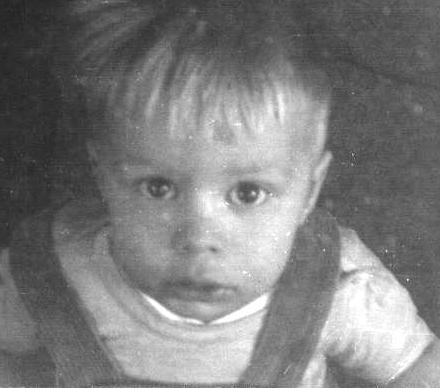
The Background of War
I was born the day my country bombed and burnt to death hundreds of thousands of mostly innocent civilians in Hiroshima, Japan. Reasons and rationalizations not withstanding, the plain fact is we showed our will to kill innocent civilians. Talk about terrorism!
Hiroshima, just before and after my birth.
Any desperate or deluded person or group can do that. Humanity won’t restrict itself to simpler weapons. Whenever there is a better shield, a better sword will be built, then a better shield. What can protect against huge bombs or tiny viruses? Military answers must and will be given, but what of spiritual and social causes and their corollary answers?
This seems a background theme of my life – the ridiculous yet typical propensity to create, and then rationalize, the needless violence and waste of war. (It isn’t just atomic bombs; we deliberately fire-bombed Japanese cities on windy nights, and have inflicted similar anguish on citizens in places we warred with, such as Dresden, Frankfurt, and Vietnam. In Iraq (which never attacked us) today [originally written in 2004] my government has killed more innocents than we lost when mostly Saudis (or so it is asserted) attacked our Trade Towers and Pentagon. War for oil is a mad rush of wasting energy to seize energy in order to go on wasting energy in our fat cars and sloppy technologies. We “attack with defense.” We accuse them of having the weapons we then use. They hate back in vengeful reprisal. We thus mutually assure ongoing cycles of revenge.
As a boy of seven or eight, I remember the happiness of the ending of the Korean War. My dad was a product-testing engineer at the Cadillac Tank Plant in Cleveland, Ohio.  My mom joked at being stuck in the top hatch of one because she was pregnant. Dad painted the testing of the new hydrogen bomb at Bikini over our mantle, the huge explosion flipping mere battleships. Mom’s sweet potato plant framed it with green leaves.
My mom joked at being stuck in the top hatch of one because she was pregnant. Dad painted the testing of the new hydrogen bomb at Bikini over our mantle, the huge explosion flipping mere battleships. Mom’s sweet potato plant framed it with green leaves.
I drew early pictures of tanks and guns. I thought the Nazi swastika was cool-looking until I realized they were the bad guys, who I should hate. Later, in high school in Michigan, I was half through All Quiet on the Western Front before I realized a German had written it. My sense of “us and them” had to get switched, because my sense of humanity for them and us was touched. We are “them” to others, though we are all inextricably “us.”
Ecology

Another concern arose in me back then on Oakland Lake in southeastern Michigan. Ecological challenges are in many ways larger than those of war. War is costly and destructive, but limited to certain arenas. The poisoning and extinction of life is ubiquitous; it is built into our ordinary technological and social processes.
On Lake Oakland I gradually became aware of the loss of life in the lake. When we got there muskrats built mounds in the lake and tunnels on the shore. I helped trap them, catching their legs below the ice so they’d drown, and I could skin them and get a dollar at the hardware store. Huge dogfish swam below their brood. I’d spear them through the babies, but then not eat them, for they were in a class with catfish, said to be not edible. We even had ancient garpike out in the middle of the deep lake with huge alligator snouts. All of these animals disappeared from the lake, eliminated by boys like me and all the lawn fertilizer and oils polluting the ecology of the lake. Regret for what was lost began to enter me. I can remember what was; new generations don’t know what’s missing and never will – unless we start to care.
My dad didn’t hunt, but I wanted to “be a man,” so I asked the man across the street if I could go hunting with him. He said he would take me, but first I had to practice by killing the blue jays that woke him in the mornings. I’d sit under his trees, BB gun in hand, waiting. When I did shoot a jay it lay there on the ground, glaring at me, as if to say, “Why?” I had to shoot it again and again. Still it didn’t die, so I threw it against the tree till it did.
I also used to flush pheasants with my Irish setter as an excuse to walk in the fields, and then we’d hunt them during season.
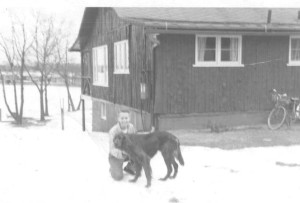
I used a single-shot 20-gauge shotgun.

But the same thing happened. I’d down a bird only to have it stare at me till I reached in and broke its neck. The few bites of meat didn’t justify the unease I felt at killing the beautiful bird.
I began to realize “being a man” meant being callous enough to kill even if my heart was against it. Realizing that, I then renounced hunting. I’d rather let the animals have their lives. Killing them violated them and me. I renounced what was not me and so became more my self. This would not fit with other boys and men, but to be an honest man I had to admit my repugnance at killing even simple creatures.
Another realization came in composting. The old German couple who lived next to us would put their table scraps in an ongoing trench in their garden, changing what would be garbage into soil. I experimented too, putting coffee grounds in a place near the shore, soon finding many more worms there. When we feed nature, enter a mutual cycle, it feeds us back.
I also began experimenting with how many sheets of toilet paper it really took to get the job done. It seemed wasteful of my parent’s money and the paper itself to use more than needed. I went from eight squares to six to four. I used less than half of what I once did. Could such a small, simple, and private thing influence the world? Only years later, reading Buckminster Fuller and Fritz Schumacher, did I realize it could and does. What even one does matters, especially when millions of ones are doing it too.
From Catholic to Nothing to UU to God’s Goods
I was the oldest of five children. Dad was twenty years older than mom. She, being Catholic, didn’t allow any sort of birth control. Five was a lot. Dad, who once told me everything a man does is to have a bed to sleep in and a woman to share it with, slept in the basement alone. Ironic, eh?
Though raised Catholic I began to question it. At age fifteen I went to the nice priest in his office (not the screened confessional) to confess I didn’t believe in the Catholic teachings on birth control and other religious teachings, so my continuing to attend was the sin of hypocrisy. I had liked the aesthetics and short sermon of the Mass and valued some aspects of the religion, but couldn’t go on pretending I believed when I didn’t. I left. This caused upheaval in my family.
In my senior year in high school I stumbled into a Methodist weekend seminar called The Ecumenical Institute. They wore us down with a recounting of the twentieth century, asking at the end, “who are you and how do you fit into this?” Am I just a student, just a consumer, or do I have some responsibility to the world?
I had taken a job at the local funeral home, doing their yard and parking cars at funerals. Then I helped move caskets and get bodies from the hospital. Then I helped on the ambulance. (Funeral homes supplied ambulance services then, using their large hearse for a makeshift ambulance. We had a fast Olds, a bit older than this one shown in the picture.)

I saw people die, saved a few from it, and caught a baby when the mother delivered it. I helped embalm bodies, even some of people I knew, back from Vietnam.
The decent owners of the funeral home urged me to get a license, so I did. Though I had studied art mostly in high school and had no plans for college, I had to do two years before going to mortuary school. While I had avoided all science earlier, I fell in love with it in junior college, especially chemistry and anatomy. The reliable marvels of the actual structure of matter and life amazed and intrigued me. I liked college-level learning so much I returned after mortuary school to work on a bachelor’s degree.
By then I had started attending a Unitarian church, attracted by a sermon about sex on Mother’s Day. Thoughtful sermons were the center of the Sunday service. Unitarians welcome and practice philosophical and social inquiry, honoring reasonable investigation and skepticism of religious claims. By the time I graduated college (in 1969, with honors in Psychology and Philosophy) I decided to leave funeral directing and become a Unitarian minister. Funeral directing can be a decent profession, and was where I worked, but it was rarified, dwelling always on bodies and grief. I wanted to take on the larger life that includes death while transcending it.
Seminary was very dynamic during those revolutionary years. The school (Meadville Lombard Theological School), supposedly liberal, was really fairly stuffy, though it was located at the famous University of Chicago.  Mircea Eliade, founder of the History of Religions, had his office on the top floor in our seminary.
Mircea Eliade, founder of the History of Religions, had his office on the top floor in our seminary.
Two ideas especially enthused me then, Jungian psychology and Eastern religions. When I got to the University of Chicago in 1969 I met a man from India who was fresh there from having trained with Carl Jung to be an analyst.
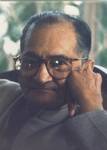
Dr. Vasavada became my close friend and teacher. Until I taught him to drive, I would drive him around. (I taught him to drive a car; he taught me to drive in life.) We’d talk of meditation and his gurus. I’d sit with him at his Friday evening group meditations. After, we’d share tea or scotch. He helped ordain me.
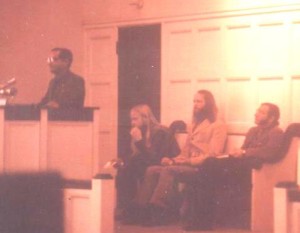 I went with him to India to meet his guru, the Blind Saint of Vrindivan, Swami Sharnanand.
I went with him to India to meet his guru, the Blind Saint of Vrindivan, Swami Sharnanand.
I had two questions for the saint. The first embarrassed the translators, but not him: “What is it like to be a saint; how does it differ from what I have?” “A saint is a member of the universal human family,” he laughed. Bronze skinned, his vacant eyes would roll down from up in his head, as if looking at me.

The second question took more answer. “I am appalled at the violence of my country in Vietnam,” I complained, “what can I do to change it?” “What is the cause of war?” he asked, and answered, “It is men taking fascination with their minds and the products of their minds,” an unexpected reply. He went on to say any effort at changing these results only in limited and sometimes opposite effects, because of being in the realm of cause and effect. He held my hands, feeling them. “What do you do?” he asked. I tried to explain my learning and Unitarian ministry. He said to give up my books and devote myself in hard physical labor to the general betterment of mankind, not asking for pay, but taking whatever is offered. “Then,” he went on, “when you are tired you will find peace, and you will emanate an invisible perfume of unlimited effect.” That perfume would create deep, un-reactive peace.
His answer, perhaps a stock one, has lived in the back of my mind ever since. It comes true, I find lately, when I work hard at building dry-stack retaining walls out of boulders, rocks, and crushed rock.
I make them as aesthetically beautiful as they are structurally sound. (See more photos at rockwalls.biz.) It is a meditation in the Now, taking lots of physical work. I sweat and toil. Each rock is its own challenge and reward. Each rock shares the load with the others. At the end of the day, my work has lasting results, lasting for hundreds of years. When I shower, it’s worth it, the dirt flowing down the drain, gone. My meditations or sleep is indeed deep. Maybe the perfume of unlimited affect emanates. Seems so.
Of the many other events and lessons in India (the large wild monkey herd at the Ellora Caves, the wild eyes of the Jain gods on the top of Mount Abu, the mix of peacocks and flies, or saints and thieves) two stand out.
One was looking into the eyes of the last remaining wild Asian lions in the Gir Western Preserve in Gudjrat State.  Modernity is driving these beautiful beasts into extinction. They epitomize the loss of life rampant in the world, like what I helped do at Lake Oakland. The rivers in India bubble from the feces fermenting in them; they are used as sewers, wasting that resource. (The sacred cows, ridiculed in the West for being a silly waste that should be killed and eaten, are actually an ecologically sensible tool. They wander all day, eating the mango rinds and other table scraps of the village, pooping fuel as they go, returning at night to be milked, which is turned into yogurt. They clean the village and provide ongoing food.)
Modernity is driving these beautiful beasts into extinction. They epitomize the loss of life rampant in the world, like what I helped do at Lake Oakland. The rivers in India bubble from the feces fermenting in them; they are used as sewers, wasting that resource. (The sacred cows, ridiculed in the West for being a silly waste that should be killed and eaten, are actually an ecologically sensible tool. They wander all day, eating the mango rinds and other table scraps of the village, pooping fuel as they go, returning at night to be milked, which is turned into yogurt. They clean the village and provide ongoing food.)
The other was meeting Sri Rajneesh, later called Osho. I had gotten horribly sick. I avoided nothing in India, thinking my resilient body would ward off any pathogens, not realizing even the Indians get dysentery. I went from a slim 145 pounds to a wasted 125. I discovered just how full of shit I was! I also had been robbed, so was grateful to be housed at a relative of Dr. Vasavada’s near the Parsi Towers of Silence

(where they leave their dead to be eaten by vultures) section of Bombay (now called Mumbai). (Vasavada and I never traveled together as planned because of a death in his family.) I saw a poster for a notorious guru, Rajneesh. India may have once had a sexual culture, as depicted in the erotic statues on some of their temples, 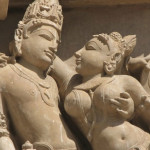 but is today a puritanical culture with clear separation of the sexes. Rajneesh, of the Tantric tradition, was said to encourage sexual wildness as a way of getting past that fascination.
but is today a puritanical culture with clear separation of the sexes. Rajneesh, of the Tantric tradition, was said to encourage sexual wildness as a way of getting past that fascination.
When Rajneesh entered the posh hotel room all his devotees glowed with adulation. He wore clean whites and sported a Rolex on his wrist and a big ring on his finger. He had incredibly beautiful eyes, very calm and present.
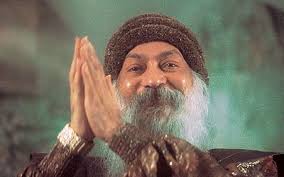
He went on about the very thing I found difficult in Indian religion – that we are not the body and this world is just maya, an illusion. I thought of how this plays into the Indians allowing their rivers to turn to cess. I thought of the square block of cardboard “houses,” only a few miles from where we sat, where a thousand people shared one water spicket and no toilet. I thought of how sick I was. Here he sat in privileged ease, a big Rolex on his wrist, knocking the communists for caring about earthly conditions, claiming realization is worth the abandonment of our mere earthly maya. I thought all this and wanted to go up and smash him hard in the nose in order to ask him a philosophical question: “If the body is not real and the world is just maya, would you mind if I hit you again?”
I didn’t, for I didn’t dislike him or want to actually hurt him (and then get me jumped by his devotees). But I saw in his smug stance a dismissive, uncaring attitude towards the very real suffering in India.
I saw the eastern belief in maya (favoring some other realm than this embodied, earthly one) as the counterpart of the western belief in an afterlife (favoring the soul’s lasting abode in heaven or hell over the mere temporary drama of our lifetimes). Neither takes the precious possibility of a lovely, sustainable life here on earth seriously or responsibly. Both substitute far-fetched speculations and egoistic posturing for an ethical and rewarding life here on earth. Both sin this way. The people of both cultures who look for identity and reasons to do what’s right are religiously misled.
I returned from India to an even greater culture shock – the shallow life of frantic and wasteful consumerism. Having seen the value of clean water when thirsty, or a banana when hungry, to see the rampant waste of our glut serving no higher purpose – dismayed me. I saw the most important thing we could export to 3rd world cultures like in India was not industrialization but examples of those living a happy life without wasting so much other life – our needs, not our greeds – as Gandhi said.
Like thousands of Gautamas coming to India from the West, relatively affluent American and European hippies went past their moneyed foundation to enter a life of spiritual seeking. Their example reminded Indians of their religious foundation gradually being lost to industrialization and consumerism. This world needs examples of those who find greater life satisfaction from simpler means. We don’t have to exploit to enjoy.
Here’s my passport photo when leaving for India and another taken after the first was stolen. I had lost 20 pounds by the second.
Skinny, broken down in spirit, I went west to southern Oregon and lived in a sort-of commune with some hippies in the woods. Oregon was so much more awesome in turns of ample nature than I had known in Michigan. The trees formed an overstory under which one can roam easily. Elevation is all in turns of weather. The salmon still come up the streams. The culture is young, not settled into family dynasties and set cultural assumptions.
With the hippies and other “counter culture” types I came to experience and value all those things we’re now told we’re to be beyond: sex, drugs, and rock ‘n roll. I affirm them. Prissy, picky, pretentious preachers never appealed to me. I am a whole human. I don’t want to sell my soul by pretending to be pious. I’m with Emerson on this – authenticity trumps posturing.
Here’s Silver Man, one of our honored elders, spreading his silverness to our youth at the Oregon Country Fair.
As a Unitarian Universalist minister for forty years now I have praised sex from the pulpit, though not as fervently as I could and it deserves. I am libertine towards it. While it can be a realm of obsession, addiction, and ample troubles, it can also be a realm of great pleasure, soul communion, and life satisfaction. The drive to think about sex ought not be denied or shamed, but welcomed, investigated, and shared. It is matched only by the other human propensity towards it: shame. I’m against the shame, religiously.
As earlier in seminary, so then with the hippies, and even now, I found certain types of drugs to be worth the risk. Pot, LSD, mushrooms, mescaline, peyote, Ecstasy, and especially 5 MeO DMT open the inner paths to realization and awed, loving connection. Being anti-addictive (though pot can be an over-used habit) they stand in the opposite corner from the problematic addictive drugs: speed (meth), cocaine (crack), heroin, and many drugs legally promoted by the pharmaceuticals. I never cared for the latter group. I never gave in to the social demand to condemn, deny, and prosecute the former. Such drugs are part of our human curiosity and right. All cultures have some sort. The issue for me (other than speaking against ignorant and counterproductive repression of them) is: which do what and so which to favor or not. Some are nothing short of entheogens (to put/find God within); they are sacraments with results. Being able to use them is our religious right.
Finally, rock ‘n roll sums up any and all human enjoyment of music. Humans make and enjoy music in a way the other animals don’t seem to. While the birds, frogs, etc., make their music, ours is far more varied and prone to make us dance. When a tune resides in my mind overnight, it intrigues and delights me. I speculate music is part of what allowed us to evolve as humans.
Besides this trio, I also came to value and promote an earlier theme from my life: ecology. How can our culture claim to be advanced if there are less salmon in the streams than when we arrived? What technological blunders enamor us to our peril? How are we being responsible if the aquifers are drained or polluted? Should we hurry to waste all our oil despite global warming? Do we value the trees, which shade the ground and transpire water, cool the air, and thus attract more rain? The shared systems of our massive yet fragile earth could live in splendid abundance for millions of years, were we to treat them right. My early care for fish, birds, compost, and using less toilet paper were part of a collective consciousness (you’re part of this, too) that cannot be a mere fad – if we are to survive.
You can read about all these provocative ideas in the rest of my web site earthlyreligion.com.
From Unitarian Universalist Ministries to God’s Goods
Healed from India in Oregon, I returned to the Midwest and took a job as a campus minister in Urbana, Illinois. There I found, while reading a Catholic bible, the most amazing scripture passage: Genesis One. Genesis One forms the scriptural foundation for God’s Goods. Though I don’t claim the bible is the “word of God,” I favor this passage for what it says God says: this universe, our earth, all life, and we humans too – are all good. This is the six stages of creation story, remarkably close to the scientific stages of physical and biological evolution theory. Significantly, each and every stage is not only created by God, but is valued by God as “good.” Humans (males and females) are part of this, which God values as good. To me, this passage justifies naturalism, humanism, and deism. To the rest of the religious world, so bent on instilling shame and alienation, it stands as a beacon and challenge.
I began preaching on this back then, forty years ago. The God of this passage is very different than the God of the Garden of Eden passage, the second creation story. That God is singular and masculine, YHWH. This God of Genesis One is singular and plural, masculine and feminine, Elohim. While Genesis Two and Three describes a change in consciousness, losing the goodness just described, chapter one reminds us of the given goodness of natural existence and suggests a way for us to be in it.
Another thinker was working on the same basis: Matthew Fox, who wrote Original Blessing. I found in his book agreement with my emerging realization of what our world needs religiously.
I married Janice Lynn in Urbana and we had our first son, Tobias Iam.  We left to investigate Costa Rica, but returned to Florida, then North Carolina, where I took a job as a country preacher for an old Universalist congregation, where I served for five years and our second son, Ira Abraham, was born.
We left to investigate Costa Rica, but returned to Florida, then North Carolina, where I took a job as a country preacher for an old Universalist congregation, where I served for five years and our second son, Ira Abraham, was born.
Here, on the Carolina coast, my dad shows my son, Tobias, the farther view.

Doing UU ministry but not having finished seminary or received the denomination’s fellowshipping (I had been ordained in 1973 by a UU church in St. Joseph, Michigan) we returned to Chicago where I received my Masters of Divinity and fellowshipping, two days after our third son, Benjamin Byron, was born (also at home, as had Ira).
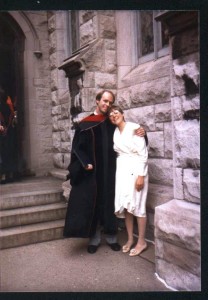
It was during this interval that I also started a three-year stint of graduate level training in humanism at the Humanist Institute in New York City. (If ever I raise money for organizations beyond my own, this would be one of them.) This valuable storehouse of  rational thought impressed me, even if it was also not very aesthetic or emotional. It is the sort of thought ridiculed by conservative Christians. It is humanity’s treasure, a valid part of any sensible and responsible religion. Unfortunately, it is largely at war with God and religion (for all the silly, sad, and diverting aspect of those). Rationalism, criticism, and skepticism are needed, but so is heartfelt religious coherence. Can humanism exist with God? To me, humanism, environmentalism, and mysticism are the fulfillment of the goods God generated.
rational thought impressed me, even if it was also not very aesthetic or emotional. It is the sort of thought ridiculed by conservative Christians. It is humanity’s treasure, a valid part of any sensible and responsible religion. Unfortunately, it is largely at war with God and religion (for all the silly, sad, and diverting aspect of those). Rationalism, criticism, and skepticism are needed, but so is heartfelt religious coherence. Can humanism exist with God? To me, humanism, environmentalism, and mysticism are the fulfillment of the goods God generated.
It was about this time when I also had the opportunity to meet Mr. Nobody, Sri Shunyat, at Vasavada’s. Shunyata is in the line of awakened mystics through Ramana Maharshi.

We liked each other and we conversed by mail for some years after that. Rational and scientific though I am and favor, I also am drawn to the inexplicable lure of the gurus, not for show or position, but because of something inner. I see this as fulfilling humanism in a way most humanists would not.
After a hellish year in Charlotte, North Carolina, I was assigned to be the first minister for the thirty-year-old fellowship in Ashland, Oregon, just miles from where I had earlier lived. We loaded up the cars and moved west.

I was to help them grow. Grow we did, tripling the congregation in a few years and buying their first church building.

I had a knack for preaching and being with people. I adopted a decidedly liberal religious public stance in an era when that word was being ridiculed and sidelined. I also helped start a fellowship in neighboring Grants Pass and often visited others in Oregon and California. Here I am giving the Invocation at the opening of the Oregon Legislature.

Success was stress. Upon occupying our new lovely building I found my creative urgings ignored. I felt isolated in the midst of the public eye, lonely for company and touch. When I started to get close to a young woman marginally related to the congregation (but stopped) it still became a huge issue. Though I answered it all honestly then, there was too much accusation and divisiveness, so I resigned at the end of my eighth year. Though over half of the congregation supported me, the wear and stress proved too much. I found no support much less understanding from my colleagues and denomination during and after that.
Having moved to ten houses by the time I had entered the fifth grade as a boy I didn’t want to jack my boys around the country in equally ephemeral ministerial settlements. I made a go of it in Ashland doing wage work, mostly picking or stacking rocks into retaining walls and steps.
I liked this hard physical work, which reminded me of Swami’s suggestion regarding labor. After a couple of years I became an independent contractor, then later an employer, all in this unexpected realm. I also continued to serve small Unitarian fellowships on weekend visits and write infrequent editorials.
This dark period of my life had serious deleterious effects on my marriage and family. Though I regret the overly riled up and harsh treatment of me by my denomination and some people in the Ashland fellowship, I most regret my mistake that played into their rout of me and my resignation. 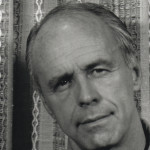 I necked with a young woman twice, and in light of that, coupled with ample punitive pressure from the UUA, a few moments of inappropriate kissing mean more than eight years of rapid success.
I necked with a young woman twice, and in light of that, coupled with ample punitive pressure from the UUA, a few moments of inappropriate kissing mean more than eight years of rapid success.
I’ve since gone on to recoil from the public stress to pay the mortgage and rebuild my spirit. I worked labor jobs – carpentry, rock walls (see rockwalls.biz), and maintenance work. I’ve done what I could to prepare and present programs, mostly for the UU Fellowship of Grants Pass, but injured by earlier UU slights, I’ve been unable to promote the cause I had once championed of this mostly admirable liberal religion.
I have managed to have fun. I retired while I worked and I work in retirement. I’m a bit like Enkidu, the Wild Man.
and my sons are leaping into life too.
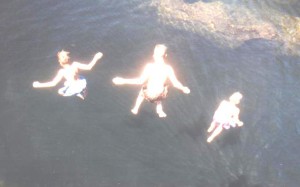
My former wife is happily remarried and my sons have all grown up well. I am proud of them all.
My “Real Work” is Prophetic and Pastoral, but can it Profit?
But in the back of my mind during ministry and after was always this urge to explore and share my earlier inspiration related to Genesis One. The question from the Ecumenical Institute was still apt: where do I place myself in history? We are the incarnate generation. Who will rescue the world from its misdirection? If not me, then who? I’m no wizard. Though I have a Masters in Divinity, I know I don’t know It All. But the view of the outside and the inclination inside both say to me, “try.” If not now, then when? How could the world’s great problem religions (Judaism, Christianity, and Islam) forget and forsake the clear message of Genesis One? It’s as if they play the role of the subtle deceiver snake, tricking us into a false or confused sense of good and evil, alienating us from the original and ongoing goods that underlie and beckon us. We lose what is good in us when we follow their subtle, alienating confusion about “good and evil.”
How is it the world’s three great monotheistic religions dwell on the problems of Genesis Two and Three, shaming people for their sexuality, tricking them out of their ability to think, excusing ecological and economic ruin, dissing evolution, waging wasteful wars, while overlooking and ignoring this single scripture passage underlying all their scriptures affirming the natural and human order as good?
For decades this message has been calling me to share it. Hence, I yield to this ongoing intuition to work in this realm, sharing and challenging both secular people and religious types to admit the words of Genesis One and to apply them to this, our given, obvious, and precious realm.
The words of Genesis One don’t create the value. The goodness of the world (and us in it) precedes and transcends any scripture. It just happens this scripture, so foundational in the world of theistic religion, also affirms the natural order and our human freedoms and responsibilities in it. It fits believers and non-believers.
I wish to devote my time, talent, and learning to this message. I don’t know where it will lead. It will unfold. There is an inexplicable blessing assisting. I am no saint. I found this religion on my (and everyone’s) fallibility and ability. I hope to spend time doing commentary, ceremonies, and counseling. I can stack rocks, and like to give my labor to that which betters a place, but my work should be more deliberate and productive now. I want to make a decent profit doing prophecy, helping save the world as I go through it and out of it.
If you’ve read this far I hope you’ll read my other sermons and editorials and help support my work, my dharma. Vasavada said dharma is our inner nature wanting to do its work. This is my “real work”: to religiously love this physical earth and our amazing bodies, to redirect our religious devotion from pining for afterlife salvation by believing in preposterous set-ups while ignoring and wasting natural creation. We should honor whatever Creator may be by living fully, well, and responsibly in Creation.
Coda: New Relationship and a Trip to Italy
I have been a lucky man. I have a strong, youthful body, a bright, creative mind, three good sons, and I’ve had wonderful relationships with women. I have lingering affection for all my women, especially my former wife. However, on July 4th, 2014 I met Maya Lyn, my sweetie and have entered a committed and promising relationship with her.

I got to spend a month with her recently where I created a planter out of all the crystal quartz on her property.

We plan to go to northwest Italy in September of 2015 for her son Zen’s wedding and birthday, and we want to walk the Cinque Terre trail along the coast. It’ll be good for me to “get out of town” and encounter the Renaissance foundation of our modern civilization in Florence.
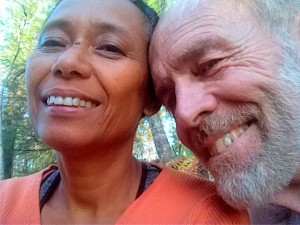
I’ve lived on the edge of poverty all my life. I’m open to changing that, in part by welcoming contributions for this fun trip and for my “real work.” If you’d like to contribute to my real work, please use the PayPal Donate button here at Earthlyrelgion. I’d like to start being paid for my worth and work. I’d like to profit enough to do effective prophesy. You can help get this new phase of my life going with any gift you feel inclined from within to send my way.
(Update as of January, 2017)
I did indeed get some money and cameras from an earlier appeal for our trip to Italy in 2015. It was a lovely once-in-a-lifetime trip. Here’s a link to a video of a slide show I made about the trip: https://www.youtube.com/watch?v=Eylh9mAHjVM&t=55s
I have a lot of gratitude for those who helped me go to and camera Italy. My relation with Maya is uncertain now.
What isn’t uncertain is my interest in getting to my “real work,” my prophetic voice to add to the cultural conversation of today. The root assumptions rampant in our conservative culture today (January, 2017) as Republicans sweep all levels of our government and Trump installs enemies of it and our environment, need to be exposed and redirected.
The great mammals of our earth are being hunted to extinction. The seas are rising, and the coral in them is bleaching and dying. Droughts, dustbowls and forest fires are growing. Rain events are flooding us like never before. A mean and judgmental approach to justice and punishment has our privatized prisons stuffed more than any other industrialized country. Stress has us scared, snapping at each other. Our religions mostly ignore all this.
If you’ve read this far, I hope you’ll go to the Participate tab and the Contribute page to consider supporting me in adding this life-affirming, life-promoting, sort of perspective to the collective conversation. Religion should relate us well to reality – outer and inner. Wholeness is our holiness.

Byron Bradley (Byrd) Carrier
August, 2004, updated 2012, 2015 and 2017






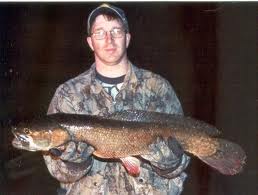



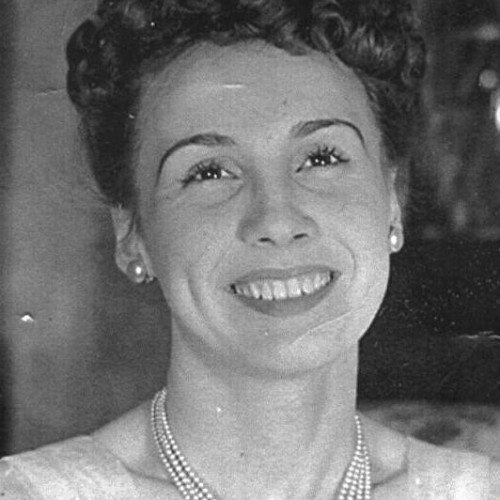

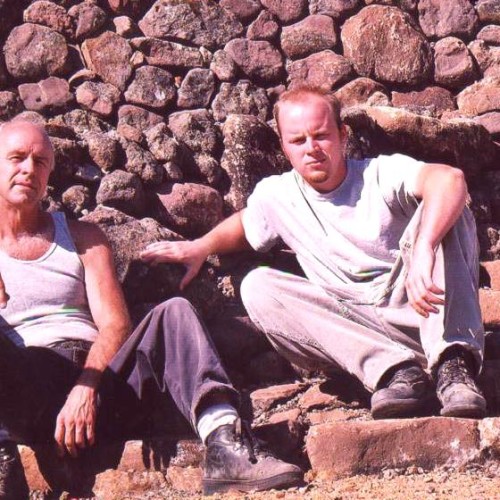
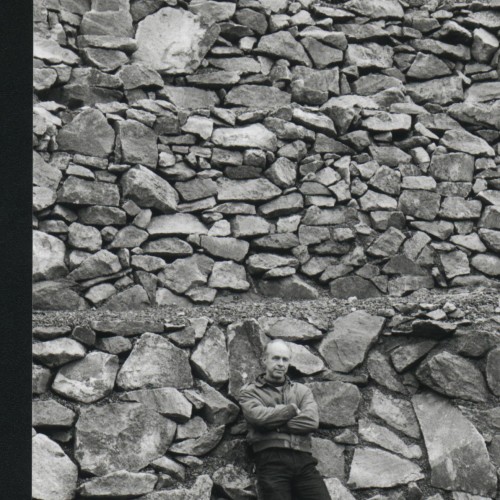
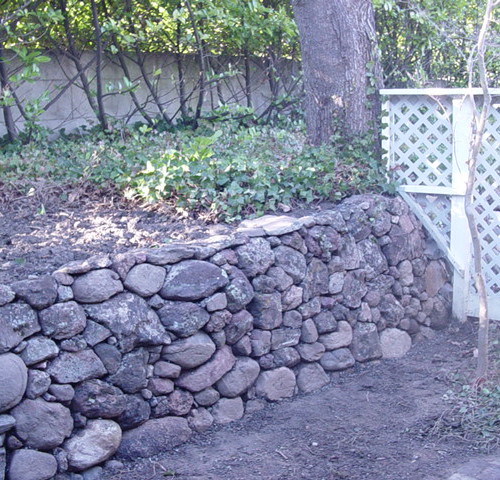
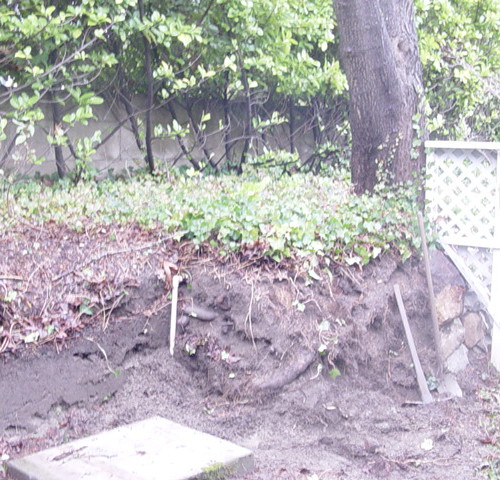
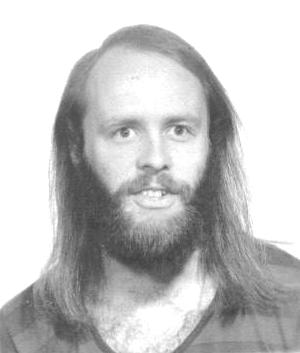

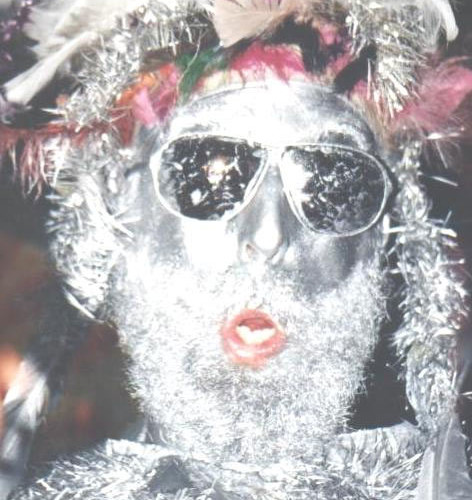
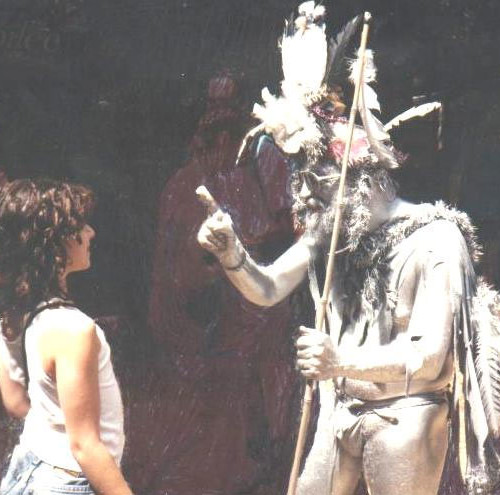
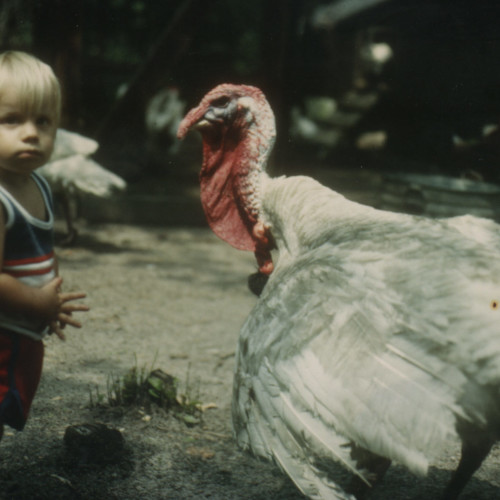



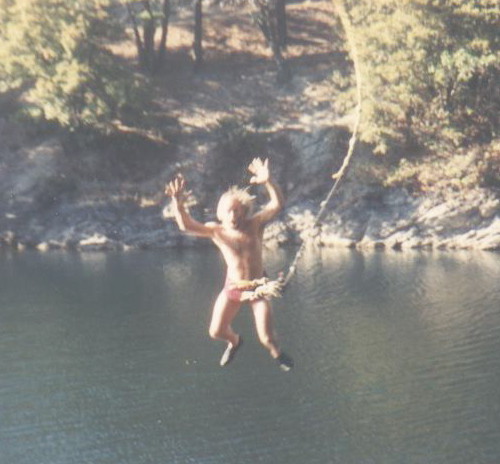

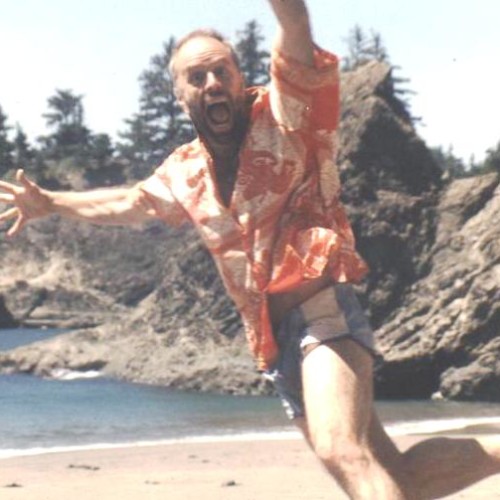
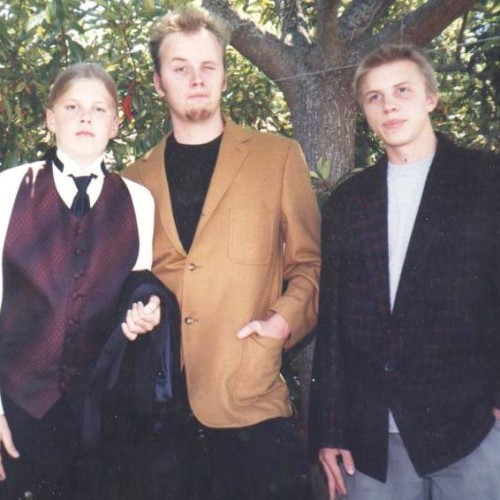
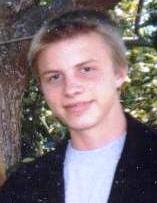
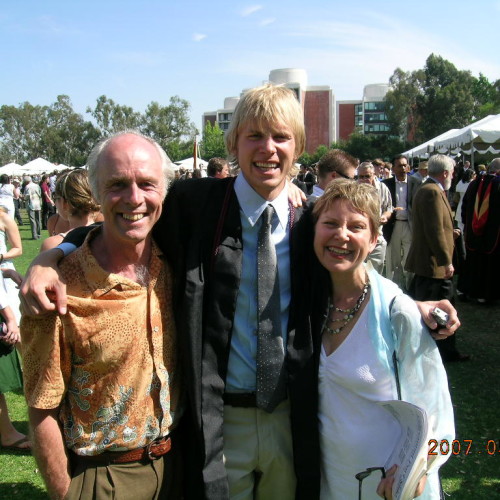


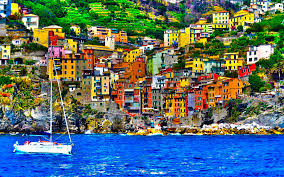

Oh !!